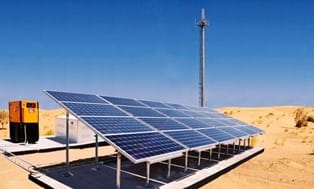Turkmenistan, being an active supporter of UN environmental conventions, is taking confident steps towards the development of renewable energy sources.
As "Turkmenistan: Golden Age" reports, today the country is actively pursuing comprehensive reforms aimed at using modern and innovative technologies. Innovations in the field of renewable energy sources are being introduced into practice.
Until recently, the country used small installations of solar panels that provided electricity and desalination of mineralized water for local users remote from central life support networks. Currently, the situation is changing dramatically.
Thus, a combined solar and wind power plant with a total capacity of 10 MW is being built on the territory of the Gyzylarbat etrap of the Balkan velayat. As industry experts note, the use of such stations and local renewable energy sources, in particular wind, will reduce consumption of fossil fuels.
In accordance with the Constitution of Turkmenistan, which enshrines the provision on state control over the rational use of natural resources and the environment, legislation is constantly being improved. The National Strategy on Climate Change, the National Strategy for the Development of Renewable Energy until 2030, the Laws of Turkmenistan “On Renewable Energy Sources” and “On Energy Saving and Energy Efficiency” have been adopted.
In addition, Turkmenistan has ratified the Vienna Convention and the Montreal Protocol on Substances that Deplete the Ozone Layer. Among the promising vectors within the framework of the “green” economy, the implementation of hydrogen production projects is being considered.
As the Minister of Energy of Turkmenistan Annageldi Saparov noted at the recently held forum “Oil and Gas of Turkmenistan - 2024”, the commissioning of a solar and wind power plant with a capacity of 10 megawatts symbolizes the beginning of the practical implementation of alternative energy sources in the country. Mention was also made of a promising combined power plant project on the shores of the Caspian Sea, which over time will allow increasing electricity exports, the source notes.
